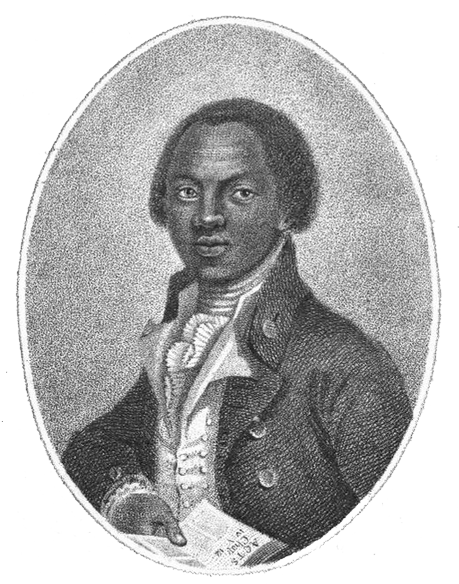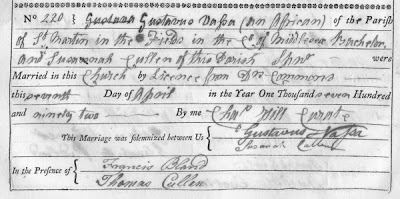Olaudah Equiano’s Bisexuality

Olaudah Equiano, also known as Gustavas Vassa, earned his place in history by writing what is considered the first Slave Narrative. Equiano’s book, The Interesting Narrative of the Life of Olaudah Equiano, or Gustavas Vassa, the African, has been analyzed from dozens of angles by countless historians and scholars. It is considered both a window into the life of a slave and freedman in the mid-eighteenth century, and into life in Africa at that time. The Interesting Narrative may also be a window into the mid-eighteenth century experience of a gay or bisexual African man.
Olaudah Equiano
Equiano was born in 1745.¹ Exactly where Equiano was born is a matter of debate: in The Interesting Narrative, Equiano describes growing up in the area that is now Nigeria, being taken to the West Indies, and then arriving in America. However, in 1999 historians found two records, a baptismal record and a British Navy muster roll, that indicate Equiano was actually born in South Carolina.² If this is true, it is believed that the first part of the book is actually from the stories of slaves Equiano encountered.³ These slaves had a story that needed to be told, especially in light of the British Parliament’s debate on whether or not to end the slave trade, but they may not have had Equiano’s writing abilities, or indeed been literate at all.
There is compelling evidence on both sides, but Equiano’s story becomes more reliable after the point where Equiano has ended up in Virginia, and is purchased by Lieutenant Michael Henry Pascal of the British Navy. With Pascal, Equiano will travel from America to the West Indies, to England, and back, several times over.⁴
Richard Baker
After being purchased by Lt. Pascal when he was around twelve, Equiano embarks on the first of many sea voyages. It is on this first ship that Equiano meets a boy, four or five years older than him, named Richard Baker. Equiano tells his audience “Soon after I went on board he shewed me a great deal of partiality and attention, and in return I grew extremely fond of him.”
Though Baker owned slaves, Equiano says that the bond they formed was able to overcome any prejudice Baker may have originally harbored. The two boys become inseparable, and Equiano relates that “we have many nights lain in each other’s bosoms when we were in great distress.”⁵
It is tempting to attribute the bond they formed entirely to the trauma they experienced together. Equiano, still reeling from being kidnapped and sold into slavery, has suddenly found himself in the British Navy. Baker is only a teenager, and has left his home for the Navy; Equiano tells us that this is Baker’s first voyage.⁶ It could be said that their bond was not romantic, but was merely based on sharing a difficult experience. But are these two things so easily distinguishable? Is it possible that their attraction to males was what that inspired them to, in their moment of need, form a connection with one another which included becoming inseparable, showing each other affection, and even cuddling (or more) at night?
People at the time did not see Equiano’s description of the relationship as innocuous. Abigail Mott, who was twenty-three when Equiano’s narrative was originally published, published an abridged version in 1829. In her version Mott reduces the relationship between the boys to no more than Baker helping Equiano improve his English. Mott intended for her version to be read by children, so it would seem that by removing Equiano’s close bond with Richard Baker (as well as the line about them sharing a bed) she believed she was removing something unsuitable for young audiences.⁷
Daniel Queen
As it is often brought up in discussions of Equiano’s sexuality, it is necessary to address his relationship with another man he encounters during his maritime journey, a man named Daniel Queen.
Equiano meets Queen farther into his time in the British Navy, after Baker has left on another ship. Queen “soon became very attached to” Equiano. He teaches Equiano how to do men’s hair, and helps him learn about the Bible. Equiano was apparently grateful, and any time he got any money he would buy things for Queen.
Equiano said of his relationship with Queen “In short, he was like a father to me.” Obviously if Equiano did have any same-gender relationships he would have had to come up with a heterosexual explanation to give his audience, such as that he loved the man like a friend, brother, or perhaps father. Equiano’s assertion that Queen was like a father to him is bolstered, however, by the fact that Queen was around forty, while Equiano was around seventeen.⁸ This makes it more likely that it was just a paternal relationship; it also shows that if the relationship was sexual, it was not consensual. Therefore Equiano’s relationship with Queen cannot be used to prove Equiano’s sexual or romantic orientation.
Equiano’s Obsession With Sin
As Equiano learns more about Christianity, he becomes fixated on the idea that he is a sinner. At one point Equiano explains “I was under strong convictions of sin, and thought that my state was worse than any man’s; my mind was unaccountably disturbed; I often wished for death, though at the same time convinced I was altogether unprepared for that awful summons.” These are the first of many mentions throughout this part of the book that Equiano believes he does not deserve to go to Heaven.⁹ So why was Equiano convinced he was so sinful?
Since Equiano’s goal is to end the slave trade, it is possible that his discussion of Christianity is a ploy. By showing himself wondering about death and what comes next, Equiano shows himself as human. Addiotionally,, the story of Equiano’s conversion and his journey to become a better Christian frame Africans in terms of having untapped potential. Equiano concedes that Africans are uncivilized and uneducated in order to appease his audience, but by showing his own journey he proves that they are not incapable of going from uncivilized to civilized, and from uneducated to educated.¹⁰
That being taken into account, the benefits of appearing a devout Christian do not wholly explain Equiano’s preoccupation with sin. His descriptions of how he worked to learn more about Chrisitanity and to find a church, as well as his testimonies of the many times Providence saved him from certain death, do a much better job of accomplishing any of the aforementioned ends Equiano could have hoped for from his discussions of his Christianity, than do descriptions of just what a miserable sinner he is. It seems that for some reason Equiano truly feared he was sinful.
Is it possible that Equiano’s complaints about his sinfulness are symptoms of a man struggling with his sexual orientation? Equiano repeatedly mentions “the many evils I felt within”. It seems these “evils” were unshakeable, as every time Equiano vows to reform he later admits that he was unable to keep this promise. Equiano’s distress only increases when someone tells him that he cannot be redeemed by doing good deeds, and he actually comes close to committing suicide. Equiano also implies that the evil he feels within him is related to sex, as he says that he hopes the evil forces “might be done away, and that I might be weaned from my former carnal acquaintances.”¹¹
It might be argued that Equiano, as a devout Christian, is simply feeling guilty about having affairs with women. If this is the case, it seems out of character for Equiano not to reveal it to his audience. Throughout most of the book, Equiano tells detailed stories of sins that he or others committed, and then explains how divine punishment was brought to bear for these things. Saying that he is worried about being punished without explaining exactly what he is being punished for almost defeats the purpose, as it fails to teach the audience anything, or even give insight into Equiano’s journey of learning not to sin. Thus whatever supposed evil feelings Equiano repeatedly acted on must have been something he believed his audience would not tolerate.
After The Interesting Narrative
Eventually Equiano settled in England. He became active in the Abolitionist cause, working briefly to help relocate poor people of African descent to Sierra Leone, and in 1789 when Parliament began debating whether to abolish the slave trade Equiano wrote his life story as a way to convince people that the slave trade was immoral.¹²

After the publication of The Interesting Narrative Equiano toured the country promoting the book. During this tour he met a woman named Susanna Cullen, and they were married on April 7, 1792.¹³ Little is known about Cullen, or her relationship with Equiano. They were married for four years, during which time they had two daughters, Anne Marie and Joanna.¹⁴ The marriage ended with Cullen’s death in 1796.¹⁵ Their daughter Anne Marie died just months later, and Equiano himself died March 31 of 1797, leaving Joanne an orphan.¹⁶
Given that he waited so long to get married, and that in his book he never mentions having relationships with women, it is tempting to suggest that Equiano was gay; but since he did marry, and as it cannot currently be proven that he was not romantically and sexually attracted to his wife, we must conclude for now that if he was attracted to men, Equiano was bisexual.
Olaudah Equiano’s life story has been searched through time and time again for the multiple perspectives and experiences Equiano has to share. Now it seems that Equiano may have one more story to tell. Upon examining Equiano’s relationship with Richard Baker and his fixation on the idea that he was sinful and unworthy a picture begins to emerge of the experience of a bisexual man forced to deal with a homophobic society while also living with the realities of eighteenth century life for an African man.
If you appriciate my work, please consider becoming my Patron! 18th Century Pride is creating LGBT+ History Content | Patreon
- https://www.britannica.com/biography/Olaudah-Equiano, “Olaudah Equiano”, The Editors of Encyclopedia Britannica
- http://www.brycchancarey.com/equiano/nativity.htm, “Where was Olaudah Equiano Born? (And Why Does It Matter?)”, Brycchan Carey
- Ibid.
- The Interesting Narrative of the Life of Olaudah Equiano, or Gustavas Vassa, The African, Olaudah Equiano. Accessible here: https://gutenberg.org/files/15399/15399-h/15399-h.htm
- Ibid.
- Ibid.
- http://librarycompany.org/gayatlcp/section9.html, “Silencing Transgressive Voices”
- See #4
- Ibid.
- See #4
- Ibid.
- Ibid.
- http://www.bbc.co.uk/history/historic_figures/equiano_olaudah.shtml, “Olaudah Equiano”
- Ibid.
- https://equiano.uk/about-equiano/, “About Equiano”
- Ibid.